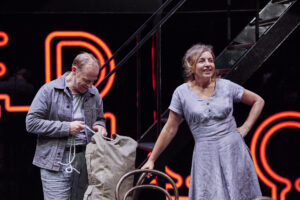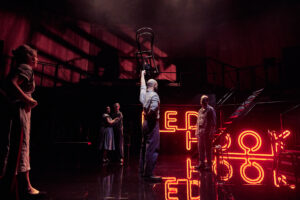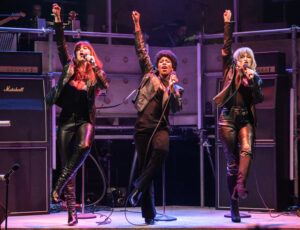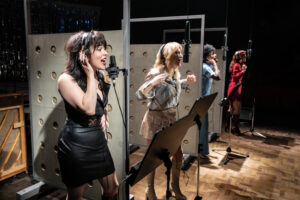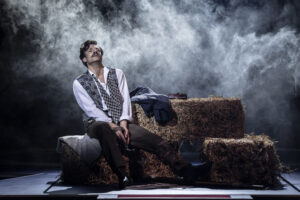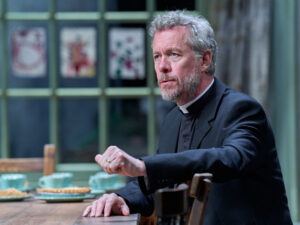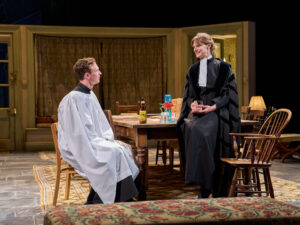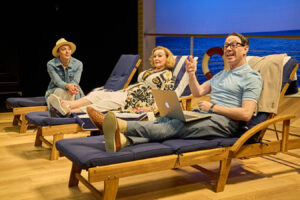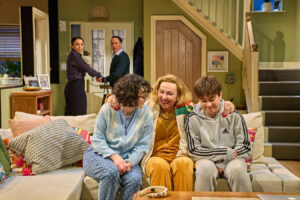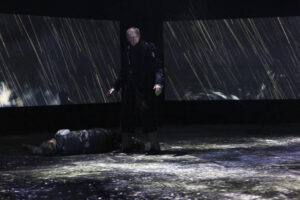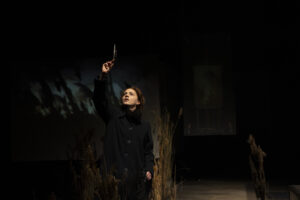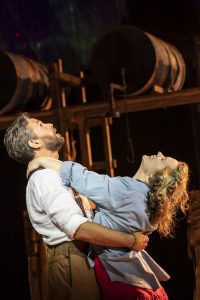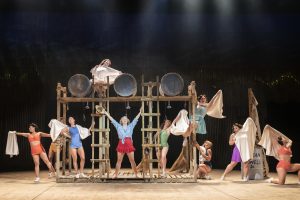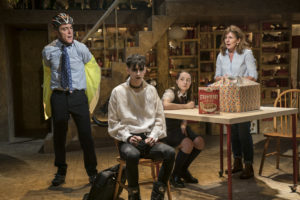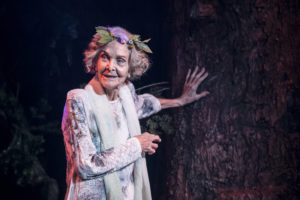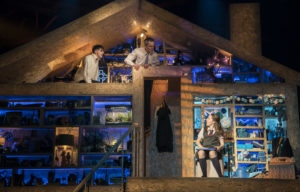Satire on corrupt officialdom is a splendid farce
⭑⭑⭑⭑
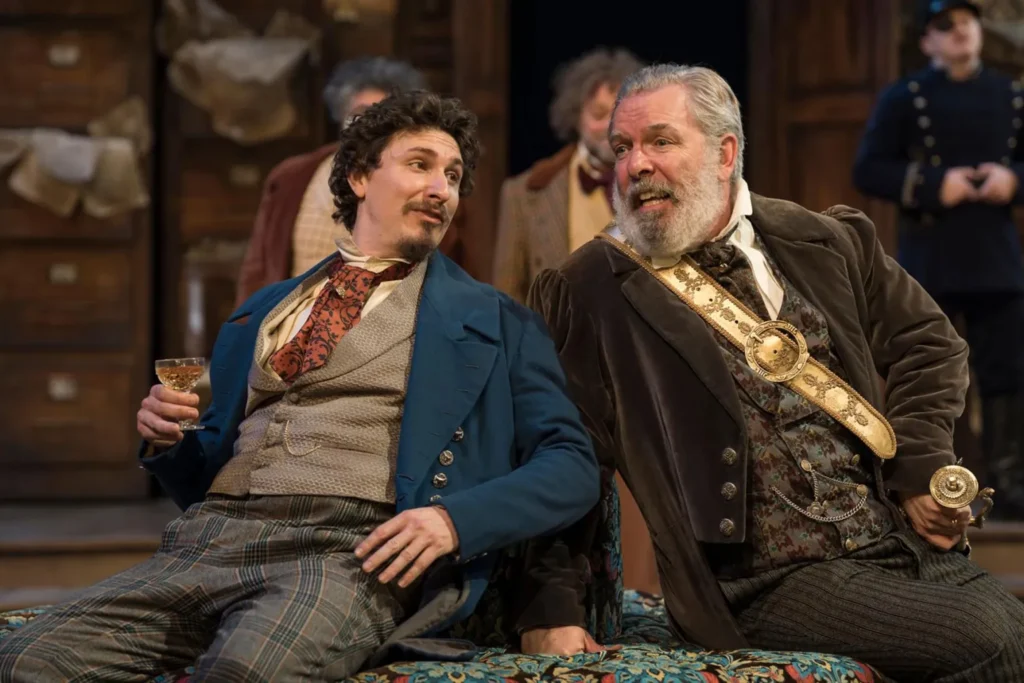
Chichester Festival Theatre has pulled out all the stops for the launch of its 2025 season: a legendary director, a complex set, and a stage filling cast, plus three musicians as a bonus. In the end, this production of The Government Inspector turns out to be slightly less than the sum of its parts, it’s not for want of trying, and I thoroughly recommend it if you’re looking for a good night out. This satire on government corruption is still relevant, and there’s a moment of physical comedy that anyone who sees it will never forget .
Gogol’s The Government Inspector is a copper bottomed classic, revolutionary when it was written nearly two hundred years ago and still an enjoyable satire on corrupt local officials. Constant revivals and more contemporary plays inspired by it – Accidental Death of an Anarchist springs to mind- may have blunted its sharpness but its depiction of politicians’ greed, bullying and cowardice still strikes a chord. And no wonder in an era of the Covid scandals and a US President who humiliates and attacks his closest allies.
This production is helped by a febrile new translation by Phil Porter, but most of all by the decision of former RSC Artistic Director Gregory Doran to turn up the physical comedy to boiling point.
Some of the slapstick had me in stitches: there’s an extraordinary moment when someone falls through a roof and crashes onto a bed, which I still can’t believe happened. In fact I was too shocked to laugh straightaway. On another occasion, a character feels ‘weak at the knees’ and then walks as if his legs are made of rubber
The story is pretty simple. There’s a report that a Government Inspector is due to visit a town full of corrupt officials. A con man called Khlestakov is mistaken for the investigator and the frightened civic chiefs try to mollify him with flattery and bribes. The truth is eventually revealed but by then he has squeezed a fortune out of them and gone on his way.
All the characters are caricatures and none have any redeeming features: in fact, the longer the play goes on, the more nasty they are revealed to be. Even the fake inspector, while he might be a hero for exposing and humiliating the officials, is no better than them in his unpleasantness to everyone around him. His arrogance and general amorality is offset by his confidence and charm which are perfectly portrayed by an imperious, smiling Tom Rosenthal.
Leading the duped is The Mayor, a bustling little man and a classic bully, condescending and sometimes vicious to those below him, obsequious to those he considers his superiors. You can feel the mounting frustration and fear in Lloyd Hutchinson’s portrayal.
The Judge, an unashamed womaniser proud to take bribes, is a huge man, played by Joe Dixon with northern bluntness and silly walks. Christopher Middleton as the Head of Schools is a wide-eyed nervous wreck. Oscar Pearce is The Charity Commissioner who is the most self serving and disloyal of all, and that’s saying something given the competition.
Comedy heights
Bobchinsky and Dobchinsky could be straight out of Munchkinland- Tweedledum and Tweedledee might be another way of looking at them. They are on the outside of the corrupt group, trying to get in. Wearing almost identical dapper suits, these social climbers are constant rivals in their desperation to impress. Played by Miltos Yerolemou and Paul Rider, they provide the best verbal and physical comedy as well as the only moment of poignancy in the entire play, when they reveal to the fake inspector their chronic need for social status.
The Mayor’s wife is a familiar character from comedy down the ages. Think Mrs Bennet or Sybil Fawlty, and any number of other ambitious middle class snobs. Sylvestra Le Touzel wrings plenty of laughs out of this stereotype. Her daughter, who is both subservient and a rival to her mother, is given a nicely judged performance by Laurie Ogden. Both are pursued by the indiscrimately libidinous Khlestakov.
Assisting him is another trope- the kind of clever, resourceful, put-upon servant that must have been a cliche even two centuries ago, but Nick Haverson throws himself into the role as if it was a fresh idea.
And that’s just half the cast.
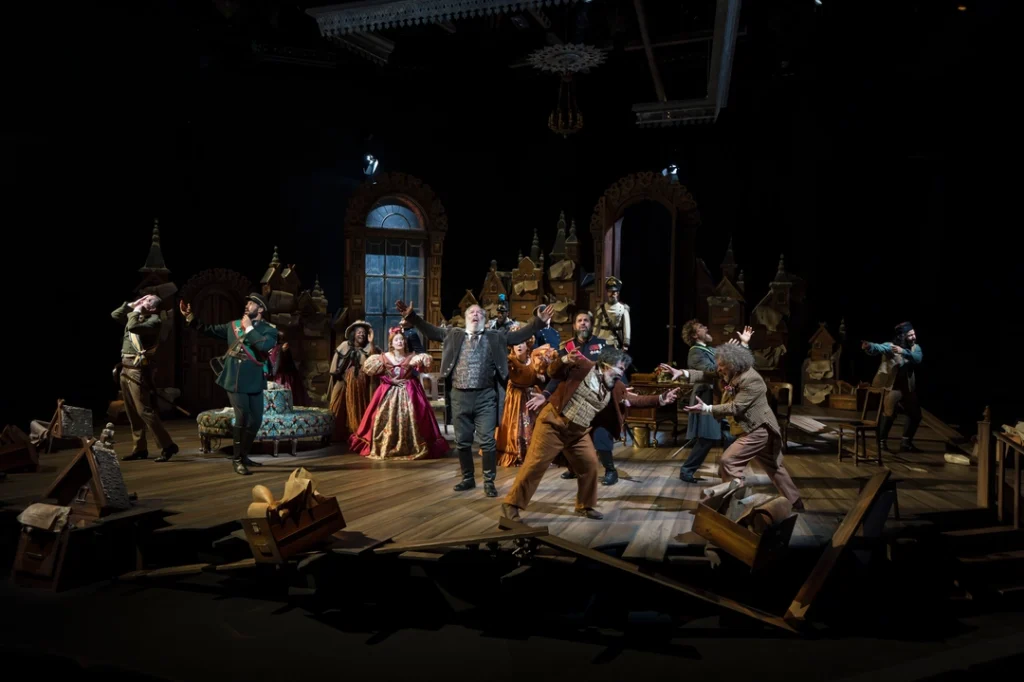
In what seems like a rarity these days, this classic is set in the original time and place- Russia in the early 19th century. This endows distance and means you can draw your own parallels with any government anywhere any time. Better still, it allows for some colourful period costumes from designer Francis O’Connor, including the musicians playing between acts in what looks like traditional Russian folk dress. He also provides a surreal set that uses filing cabinet drawers overflowing with papers not only as part of the walls but also along the apron of the thrust stage. The effect is of chaotic bureaucracy bursting out of an old fashioned office.
The slapstick reduces in the second act as we discover the true barbarity of these comic characters, which frankly isn’t funny, but there is still time for an hilarious climactic fight involving almost all the cast. Congratulations, Movement Director Mike Ashcroft.
There may not be quite as many laughs as the opening scenes promise, nor is there a single twist you didn’t see coming but The Government Inspector at Chichester is still a a lot of fun, and as shockingly relevant today as it has ever been. Seeing those terrible politicians getting their comeuppance is worth the price of the ticket alone.
The Government Inspector can be seen at Chichester Festival Theatre until 24 May 2025. Click here to buy tickets direct from the theatre.
Click to watch this review on the YouTube channel Theatre Reviews With Paul Seven
